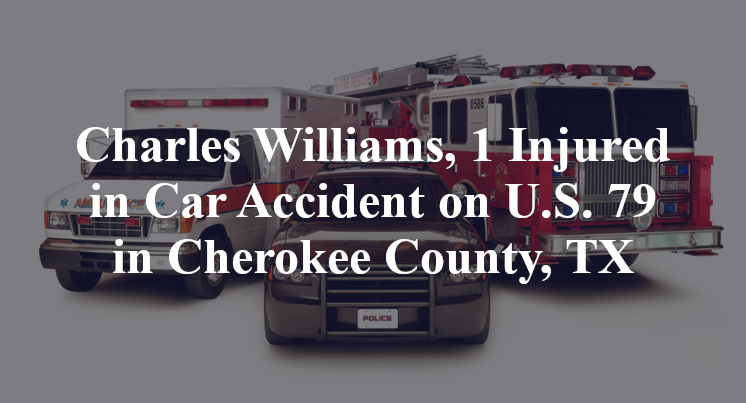Charles Williams, 1 Injured in Car Accident on U.S. 79 in Cherokee County, TX
Cherokee County, TX — May 8, 2025, Charles Williams and one other person were injured in a car accident at approximately 4:15 p.m. along U.S. Highway 79.
According to authorities, 69-year-old Charles Williams was traveling in an eastbound Ford F-350 pickup truck on U.S. 79 in the vicinity east of Myrtle Drive when the accident took place.

Officials indicate that, for as yet unknown reasons, the Ford attempted a turn at an apparently unsafe time. This resulted in a collision with an eastbound Chevrolet Silverado pickup truck occupied by a 57-year-old man.
Williams reportedly suffered serious injuries over the course of the accident. The man from the Silverado sustained minor injuries, as well, according to reports. Additional details pertaining to this incident are not available at this point in time. The investigation is currently ongoing.
Commentary by Attorney Michael Grossman
When a vehicle attempts a turn and ends up in a collision with another traveling the same direction, the situation is often written off as poor timing. But when one driver ends up seriously injured, it’s worth asking whether that decision was entirely a human error—or if something else played a role in what went wrong.
1. Did the authorities thoroughly investigate the crash?
In any turn-related crash, investigators need to understand not just where the vehicles ended up, but how they got there. Did the Ford F-350 signal its turn? Was there a sudden slow-down, or did the Silverado attempt to pass? These details matter and require full scene documentation, including skid marks, vehicle positions, and any available eyewitness or dashcam footage. Without that, the narrative risks oversimplifying a potentially complex chain of events.
2. Has anyone looked into the possibility that a vehicle defect caused the crash?
If the Ford’s turn seemed “unsafe,” it’s fair to ask whether it went as the driver intended. A delay in acceleration, a steering issue, or a malfunction in the indicator system could have disrupted a routine turn. These issues might not leave visible evidence, especially after impact. Only a detailed mechanical inspection can confirm whether the truck responded the way the driver expected—or failed in a critical moment.
3. Has all the electronic data relating to the crash been collected?
Modern pickups like the F-350 and Silverado are typically equipped with event data recorders. These systems can reveal speed, brake input, turn signal activation, and throttle position in the moments leading up to the crash. If that data is preserved, it could clarify whether the Ford’s driver acted with appropriate caution and whether the Silverado had time to react. Without that digital footprint, investigators may be left guessing at crucial details.
Turn-related crashes on highways often look like simple misjudgments. But when the outcome is serious, the investigation needs to be just as serious—because knowing what really happened takes more than reading the aftermath.
- Turn collisions require a full timeline reconstruction to assess decision timing.
- Vehicle malfunctions can lead to unsafe turns, even when intentions are sound.
- Electronic data can confirm whether actions and responses matched the conditions.

*We appreciate your feedback and welcome anyone to comment on our blog entries, however all visitor blog comments must be approved by the site moderator prior to showing live on the site. By submitting a blog comment you acknowledge that your post may appear live on the site for any visitors to see, pending moderator approval. The operators of this site are not responsible for the accuracy or content of the comments made by site visitors. By submitting a comment, blog post, or email to this site you acknowledge that you may receive a response with regard to your questions or concerns. If you contact Grossman Law Offices using this online form, your message will not create an attorney-client relationship and will not necessarily be treated as privileged or confidential! You should not send sensitive or confidential information via the Internet. Since the Internet is not necessarily a secure environment, it is not possible to ensure that your message sent via the Internet might be kept secure and confidential. When you fill out a contact or comment form, send us an email directly, initiate a chat session or call us, you acknowledge we may use your contact information to communicate with you in the future for marketing purposes, but such marketing will always be done in an ethical way.